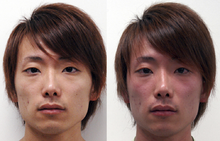| This article needs additional citations for verification. Please help improve this article by adding citations to reliable sources. Unsourced material may be challenged and removed. Find sources: "Flushing" physiology – news · newspapers · books · scholar · JSTOR (June 2018) (Learn how and when to remove this message) |
| Flushing | |
|---|---|
 | |
| Facial flushing in a 22-year-old man before (left) and after (right) | |
| Specialty | Dermatology |
Flushing is to become markedly red in the face and often other areas of the skin, from various physiological conditions. Flushing is generally distinguished from blushing, since blushing is psychosomatic, milder, generally restricted to the face, cheeks or ears, and generally assumed to reflect emotional stress, such as embarrassment, anger, or romantic stimulation. Flushing is also a cardinal symptom of carcinoid syndrome—the syndrome that results from hormones (often serotonin or histamine) being secreted into systemic circulation.
Causes
- abrupt cessation of physical exertion (resulting in heart output in excess of current muscular need for blood flow)
- abdominal cutaneous nerve entrapment syndrome (ACNES), usually in patients who have had abdominal surgery
- alcohol flush reaction
- antiestrogens such as tamoxifen
- atropine poisoning
- body contact with warm or hot water (hot tub, bath, shower)
- butorphanol reaction with some narcotic analgesics (since butorphanol is also an antagonist)
- caffeine consumption
- carbon monoxide poisoning
- carcinoid tumor
- chronic obstructive pulmonary disease (COPD), especially emphysema (also known as "pink puffer")
- cluster headache attack or headache
- compression of the nerve by the sixth thoracic vertebrae
- coughing, particularly severe coughing fits
- Cushing's syndrome
- dehydration
- dysautonomia
- emotions: anger, embarrassment (for this reason it is also called erythema pudoris, from the Latinized Greek word for "redness" and the Latin "of embarrassment")
- fever
- fibromyalgia
- histamines
- homocystinuria (flushing across the cheeks)
- Horner's syndrome
- hot flush
- hyperglycaemia
- hyperstimulation of the parasympathetic nervous system, especially the vagus nerve
- hyperthyroidism
- inflammation (for example, caused by allergic reaction or infection)
- iron poisoning
- Jarisch-Herxheimer reaction (caused by antibiotics)
- keratosis pilaris rubra faceii
- Kratom
- mastocytosis
- medullary thyroid cancer
- mixing an antibiotic with alcohol
- neuroendocrine tumors
- niacin (vitamin B3)
- pheochromocytoma
- polycythemia vera
- powerful vasodilators, such as dihydropyridine calcium channel blockers
- severe pain
- sexual arousal, especially orgasm (see following section)
- sexual intercourse (see below)
- sneezing (red nose)
- some recreational drugs, such as alcohol, heroin, cocaine and amphetamines
- spicy foods
- sunburn (erythema)
- tachycardia
- vinpocetine
Sex flush
Commonly referred to as the sex flush, vasocongestion (increased blood flow) of the skin can occur during all four phases of the human sexual response cycle. Studies show that the sex flush occurs in approximately 50–75% of females and 25% of males, yet not consistently. The sex flush tends to occur more often under warmer conditions and may not appear at all under lower temperatures.
During the female sex flush, pinkish spots develop under the breasts, then spread to the breasts, torso, face, hands, soles of the feet, and possibly over the entire body. Vasocongestion is also responsible for the darkening of the clitoris and the walls of the vagina during sexual arousal. During the male sex flush, the coloration of the skin develops less consistently than in the female, but typically starts with the epigastrium (upper abdomen), spreads across the chest, then continues to the neck, face, forehead, back, and sometimes, shoulders and forearms.
The sex flush typically disappears soon after reaching orgasm, but in other cases, may take up to two hours or more, and sometimes intense sweating occurs simultaneously.
See also
References
- Heller, Jacob L. (10 Aug 2017). "Iron overdose". MedlinePlus Medical Encyclopedia. National Institutes of Health. Retrieved 15 July 2019.
| Classification | D |
|---|
| Signs and symptoms relating to skin and subcutaneous tissue | |
|---|---|
| Disturbances of skin sensation | |
| Circulation | |
| Edema | |
| Other | |
| Skin | |
| Nails | |